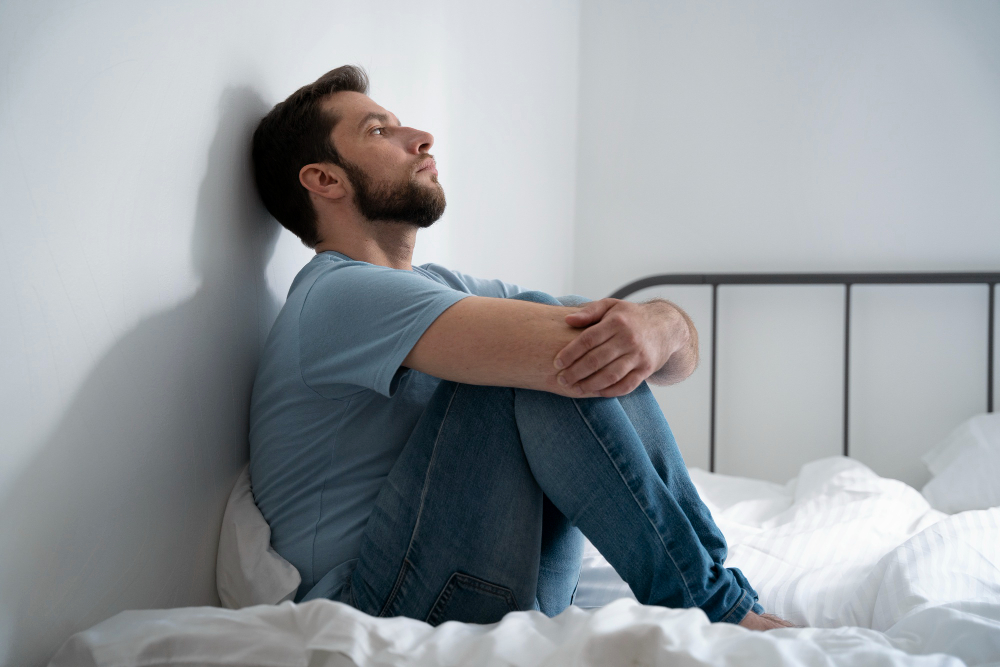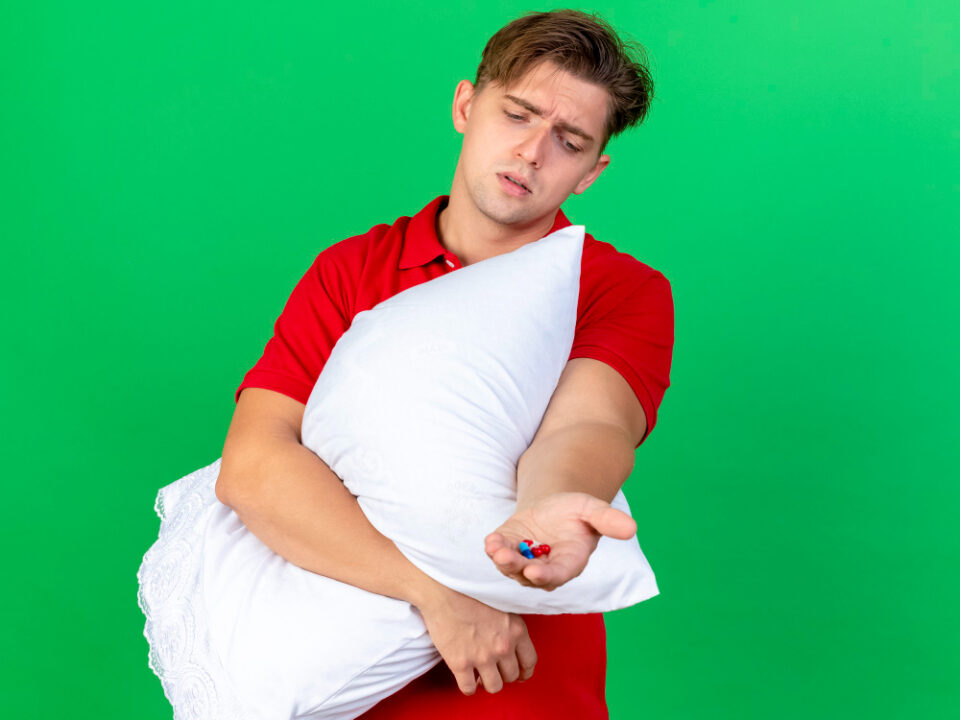- 21103 Vanowen St Woodland Hills, CA 91303 | Call us today!
- 310-879-9266
Insomnia Signs and Symptoms As Related to Testosterone Deficiency

Insomnia, characterized by one or more of several issues related to sleep: difficulty falling asleep, staying asleep, or achieving restorative sleep. Insomnia and its long-tern chronic affects can significantly impact one’s quality of life. Recent research indicates a very strong link between insomnia and testosterone deficiency in men. Testosterone, the primary male sex hormone, plays a crucial role in various bodily functions, including sleep regulation. In this article we will look at how low testosterone or testosterone deficiency can contribute to insomnia and its associated signs and symptoms.
Understanding Testosterone’s Role in Sleep
Testosterone levels naturally fluctuate up and down throughout any given day, typically peaking in the early morning and declining by the evening. Testosterone is involved in the regulation of the sleep-wake cycle and overall sleep quality. Adequate testosterone levels are essential for maintaining a healthy sleep patterns, and a low or deficient testosterone can disrupt the sleep processes in many ways.
Signs and Symptoms of Insomnia Related to Testosterone Deficiency
- Difficulty Falling Asleep: Men with low testosterone levels may find it challenging to fall asleep at night. This can be due to increased anxiety, restlessness, or hormonal imbalances that disrupt the normal sleep-wake cycle.
- Frequent Awakenings During the Night: Testosterone deficiency can lead to fragmented sleep, causing frequent awakenings throughout the night. This disruption prevents the individual from reaching the deeper, restorative stages of sleep.
- Reduced Sleep Duration: Men with low testosterone may experience shorter overall sleep duration. Even if they manage to fall asleep, they might wake up earlier than intended and be unable to fall back asleep.
- Non-Restorative Sleep: Despite spending adequate time in bed, men with low testosterone levels often report feeling unrefreshed upon waking. This is due to the lack of deep, restorative sleep stages.
- Daytime Fatigue and Sleepiness: Chronic sleep disturbances associated with testosterone deficiency can lead to significant daytime fatigue and sleepiness. Men may feel tired and lethargic throughout the day, impacting their productivity and overall well-being.
- Mood Disturbances: Low testosterone levels are linked to mood disorders such as depression and anxiety, which can further exacerbate insomnia. Men may experience mood swings, irritability, and a general sense of malaise.
- Decreased Libido and Sexual Dysfunction: Testosterone deficiency often leads to decreased libido and erectile dysfunction. The stress and anxiety associated with these issues can contribute to sleep disturbances, creating a vicious cycle.
- Cognitive Impairment: Sleep is essential for cognitive function and memory consolidation. Men with insomnia related to testosterone deficiency may experience difficulties with concentration, memory, and decision-making.
Mechanisms Linking Testosterone Deficiency and Insomnia
- Hormonal Imbalances: Testosterone interacts with other hormones that regulate sleep, such as melatonin and cortisol. Low testosterone levels can disrupt the balance of these hormones, leading to sleep disturbances.
- Increased Inflammation: Testosterone has anti-inflammatory properties. A deficiency can lead to increased inflammation, which has been linked to sleep disorders and poor sleep quality.
- Obstructive Sleep Apnea (OSA): Men with low testosterone levels are at a higher risk of developing obstructive sleep apnea, a condition characterized by repeated breathing interruptions during sleep. OSA can significantly disrupt sleep and contribute to insomnia.
- Psychological Factors: Testosterone deficiency can lead to psychological issues such as depression, anxiety, and stress, all of which are known to interfere with sleep.
Addressing Insomnia Related to Testosterone Deficiency
- Testosterone Replacement Therapy (TRT): TRT can help restore normal testosterone levels, potentially improving sleep quality and reducing insomnia symptoms. However, it is essential to consult with a healthcare provider to determine if TRT is appropriate and to monitor for potential side effects.
- Sleep Hygiene Practices: Implementing good sleep hygiene practices can help improve sleep quality. This includes maintaining a consistent sleep schedule, creating a comfortable sleep environment, limiting screen time before bed, and avoiding caffeine and alcohol in the evening.
- Cognitive Behavioral Therapy for Insomnia (CBT-I) or Cognitive Behavioral Training (CBTr-I) for Insomnia:
- CBT-I is a structured therapy program which acts to help individuals identify and change negative thoughts and behaviors that contribute to sleep problems. It can be particularly effective for those experiencing insomnia related to psychological factors. CBT-I is run by a skilled therapist and deals with individuals with emotion, psychological issues that need resolution.
- CBTr-I is a structured therapy program which acts to help individuals identify and change negative thoughts and behaviors that contribute to sleep problems. It is designed for normal people to teach them either one-on-one or n small groups to understand insomnia and make changes in their live and lifestyle that will help them undo whatever negative forces are causing them to lose sleep.
- Lifestyle Modifications:
- Regular exercise, a healthy diet, and stress management techniques can positively impact both testosterone levels and sleep quality. Weight management is also crucial, as obesity can exacerbate both low testosterone and sleep apnea.
- This can be done by a CBTr-I trainer and usually deals with lifestyle changes, including diet and implementing sleep hygiene techniques, finding and resolving unresolved conflicts which cause insomnia.
- Medical Evaluation: It is essential to undergo a thorough medical evaluation to identify and address any underlying conditions which may be causing or contributing to insomnia and testosterone deficiency. This may include blood tests, sleep studies, and assessments for conditions like sleep apnea.
Now that we recognize that testosterone can and does affect insomnia, let’s look more intently at insomnia for while we are working on testosterone replacement you can learn how you have trained yourself how to have difficulty sleeping and now have insomnia. While our primary goal here is rebalancing your hormones, your secondary goal can become getting used to and become an expert in managing your own testosterone levels, a third goal can also be for you to learn how to treat, manage and eliminate insomnia if this is a problem for you.
Herein, below, I now offer a totally different approach for breaking down, looking at, understanding, and then working on eliminating both the short-term and long-term negative affects of insomnia. In this set of information we look at how you can recognize insomnia by its Nighttime and Daytime signs and symptoms, how insomnia, if left unchecked, can will affect your overall behavior, your emotions, as well as you body, We can also look at acute and then chronic effects of insomnia on you and your body. We will also briefly discuss treatment and management of insomnia. Last, and very importantly, we will look at how and where you can get professional help to eliminate your insomnia and return to full normal.
Acute Insomnia
Nighttime Symptoms
- Difficulty falling asleep despite being tired.
- Frequent awakenings during the night.
- Waking up too early and not being able to fall back asleep.
- Restless sleep or feeling like you are not getting restful sleep.
- Lying awake for long periods in bed at night.
Daytime Symptoms
- Fatigue or low energy.
- Daytime sleepiness.
- Irritability, mood disturbances, or anxiety.
- Difficulty concentrating or focusing.
- Memory problems.
- Increased errors or accidents.
- Lack of motivation or energy.
- Tension headaches or feeling of pressure in the head.
- Gastrointestinal symptoms (e.g., upset stomach).
Behavioral Symptoms
- Worrying about sleep or having anxiety around bedtime.
- Using sleep aids or alcohol to try to fall asleep.
- Avoiding social activities or work responsibilities due to fatigue.
- Napping during the day to compensate for poor nighttime sleep.
Emotional Symptoms
- Depression or feeling down.
- Increased stress and difficulty managing stress.
Physical Symptoms
- Muscle tension or aches.
- Increased heart rate or palpitations.
- Dry mouth or sore throat in the morning.
Chronic Insomnia
If insomnia persists for a month or longer and occurs at least three nights per week, it is considered chronic insomnia. Chronic insomnia can have significant impacts on overall health and quality of life.
Causes of Insomnia
- Stress: Stress over work, school, health, or family concerns; thinking about any unresolved conflict(s).
- Anxiety and Depression: The end result o too much stress and unresolved conflict in your life also slack of sleep.
- Poor Sleep Habits: Irregular sleep schedule, stimulating activities before bed.
- Medical Conditions: Chronic pain, asthma, diabetes, heartburn.
- Medications: Certain prescriptions and over-the-counter medications. Check with your pharmacist regarding each of your medications.
- Caffeine, Nicotine, and Alcohol: each of these substances can affect the onset and quality of your sleep.
- Environmental Factors: Noise, light, or uncomfortable temperatures.
Management and Treatment
- Therapy: Either Cognitive Behavioral Therapy for Insomnia (CBT-I) or Cognitive Behavioral Training (CBTr-I) for Insomnia.
- Medications: Prescription sleep aids, but these should be used under medical supervision.
- Lifestyle Changes: Regular sleep schedule, creating a restful sleep environment.
- Relaxation Techniques: Meditation, deep breathing exercises.
- Avoiding Stimulants: Limiting caffeine and nicotine intake, especially before bedtime.
- Physical Activity: Regular exercise, but not too close to bedtime.
When to See a Doctor
- If insomnia persists for more than a few weeks.
- If it significantly impacts daily life and functioning.
- If there are underlying health conditions or concerns about mental health.
Proper diagnosis and treatment are essential to manage insomnia effectively and improve sleep quality and overall well-being.
If you want help but do not know where to start, I suggest setting up a consultation with one of our practitioners to evaluate your sleep issues and then direct you to the best help for you.
Insomnia and testosterone deficiency are interconnected issues that can significantly impact a man’s quality of life. Recognizing the signs and symptoms of insomnia related to low testosterone is crucial for effective management. By addressing the underlying hormonal imbalance and implementing strategies to improve sleep hygiene, men can achieve better sleep and overall well-being. Consulting with healthcare providers is essential to develop a comprehensive treatment plan tailored to individual needs.

Article by Dr. Allen Lawrence, M.A., M.D., Ph.D.




